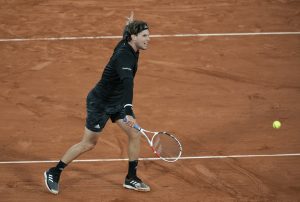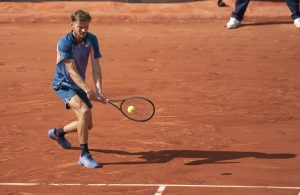There’s no doubt Naomi Osaka is a great tennis player; at just 23 years of age, the superstar has already won four Grand Slams, and is ranked #1 in the world. When it comes to the off-court side of things, however, it’s very different. The superstar now claims she won’t do media press conferences during Roland Garros due to her mental health.
Naomi Osaka and 2020 Activism
To begin, let’s just take a quick look at what Osaka has done in the past. She originally withdrew from the Western & Southern Open semifinals last year to protest against “continued genocide of Black people at the hand of the police.” Instead, this led to the event postponing Thursday’s matches and her deciding to then play on the Friday despite previously withdrawing. This just gives the impression someone who has no respect for the tournament, the tour, fans, and fellow players.
Now, add that to not speaking to the media at Roland Garros, and what is evident is how entitled she clearly thinks she is to get away with all this. Let’s also just take a moment to realize she is the highest-earning sportswoman in the world right now–and eighth overall in endorsements in 2020, including men. She’s that marketable–she is the highest-paid sportswoman ever. How can someone become that marketable, you may ask? Well, much of that is from media coverage–the same media she intends to boycott during the second Grand Slam of the year. There’s no doubt that in the last few years of women’s tennis no player has benefitted more from media coverage than Osaka, evidenced by the persona she has built up and all the multi-million dollar endorsement deals.
The Claims
Now let’s look at this even further. Osaka believes that some people have “no regard for athletes’ mental health.” She’s totally right here. We’ve all seen in the past some tennis journalists call players by the wrong name, ask them inappropriate and insulting questions, and so on. Ultimately, though, that’s what every famous person must deal with. There are no exceptions–the bigger you are in the media world the more likely it is to happen. You can’t have all the rewards for being a celebrity without the issues it may also bring. Especially for an athlete, where part of the job is bringing the sport to fans.
Just to use another tennis example, let’s look at Novak Djokovic. The man has 18 Grand Slams and the most weeks at #1, amongst countless other achievements, and even now many media love to make him out to be the villain. At the end of the day, though, he’s now just turned 34 years old and has been suffering with it his whole career. Only in February this year did the Serb finally say, “The media portray me unfairly and it does sometimes get to me.” For example, after he was disqualified at the US Open last year and missed his following press conference, the media had a field day attacking the World #1. If that’s the case for Djokovic, why should Osaka expect differently?
Another thing I don’t fully understand is that she comes across as someone who doesn’t realize everyone has potential mental health issues, especially at a time like this when we’re still living during a worldwide pandemic. Unlike her, though, most people aren’t able to boycott this and get away from their jobs to improve their mental health. If most people took similar measures fore their mental health, it likely wouldn’t end as well for them as well as for Osaka.
Unnecessary attention
The last thing I want to mention is how all of this didn’t even need to be said. The fact is, Osaka is someone who platitudes about social justice and mental health and the media fawn over her, yet rarely if ever does she say anything meaningful about it. Her activism hasn’t included details of issues or solutions.
Also, what happened in New York last year could have been avoided by simply not playing the event to begin with as a form of protest. Instead, her method brought politics to the sport to such a large extent play had to be suspended for a day. And, of course, tennis is an international sport. And yet other, non-American athletes were expected to support her. For example, Victoria Azarenka received criticism for also not boycotting her semifinal. The Belarussian’s response, to paraphrase, was, “There are other problems in the world, too.” (At the time, Belarus was in the midst of massive protests after an election with major integrity issues.)
Osaka herself said that she “wanted to cause the most stir.” Without discussing the issue she was protesting about, it speaks to a level of entitlement to begin with. The ability to “cause stir” at work with minimal consequences is something few people have. Osaka drew attention by, at most, giving up a few ranking points and a negligible (for her) difference in prize money. Instead, the tournament supported her so much that there were no consequences whatsoever.
Then, of course, she could have simply not shown up to her media obligations in Paris next week and accepted the fines–which are almost nothing to her anyway, given her income. Instead, she made a statement about how she’s not going to do it, getting the attention that comes with it.
Of course, Naomi Osaka is a great tennis player. She is the best in the world and might be the most talented ever. But I’m not a fan of everything else. It’s not hard to see that she thinks she’s bigger than the game at times. For that reason alone, she needs to take a step back.
This is an Opinion piece. As such, it does not necessarily reflect the views of anyone at LWOT other than the author.
Main Photo from Getty.






